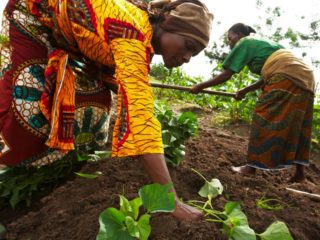NIRSAL, Stanbic IBTC sign MoU on N50bn agric finance
Nigeria Incentive Based Risk
Sharing System for Agricultural Lending (NIRSAL) has signed a memorandum of
understanding (MoU) with Stanbic IBTC to enable individuals, cooperatives,
companies, organised investment groups that have bankable agriculture projects
have access to N50 billion.
Mr. Aliyu Abdulhammed, NIRSAL
Managing Director, explained that under the terms of the agreement, Stanbic
IBTC would give loans of bankable agriculture projects while NIRSAL would
provide credit guarantees. He added that the credit guarantees would range from
50 to 75 per cent depending on the aspect of the agricultural value chain that
loan is given.
He said the financing scheme
would cover NIRSAL supported projects livestock, cross, mechanisation, logistics
and poultry value chains. He noted that the initial N10 billion financing
scheme would impact on some selected segment including “Farm mechanisation,
where 1,250 new tractors will be purchased, 5,000 direct jobs created and
250,000 lives will be impacted.
“In poultry; 8.3 million birds,
spread across 16,000 SHFs with 83,300 lives impacted. In agriculture; 11
million table fish for 11,000 SHFs having average stock of size 1,000 fish,
while 55,000 lives impacted. Arable crops; 15,000 hectares cultivated with
100,000 direct jobs for SHFs at an average land size of 0.5 hectares, while
additional 500,000 lives will be impacted ,” among others.
“The scheme is also a testament
to our shared vision for agriculture as a profitable enterprise and a key
driver of the Nigerian economy. We are committed to providing Stanbic IBTC with
the cover to lend to agriculture and are happy that its management has agreed
to partner with us on this project.”
Speaking at the signing of MoU, Dr.
Demola Sogunle, Managing Director of Stanbic IBTC, said “Nigeria economy is to
a large extent diversified looking at the components of the GDP. The problem or
what is not diversified is the source of government revenue, which is
concentrated in oil and gas. So, government revenue is not diversified and
external earnings of Nigeria are also not diversified, 75 to 80 percent
concentrated in oil and gas.”
Sogunle explained that after
holding meeting with NIRSAL, “we went through our own risk management, risk
acceptance criteria and we came up with a product programme to tow aide of N10
billion. This is just phase one of the journey which is to turn agricultural
total value chain of that sector to something that will be attractive and
something that can generate revenue for the country.
“Internally, we have agreed that
every agricultural project we are going to finance, one of the things when it
comes to risk acceptance criteria, we have to check the eligibility of that
venture. We have to test it for NIRSAL eligibility, it means we have also
started to change our risk acceptance criteria to align with that of NIRSAL.
“If any business proposal is able
to pass our own risk acceptance criteria, we want a situation whereby it will
also pass that of NIRSAL. If any application goes through that of NIRSAL and is
able to come out successfully, it should also pass our own,” he added.




Comments
Post a Comment